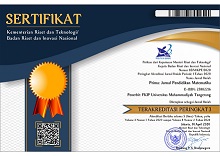STATISTICAL LITERACY ABILITY OF BOARDING AND NON-BOARDING STUDENTS AT MAN 1 SURAKARTA
Abstract
Keywords
Full Text:
PDFReferences
Andriatna, R., Kurniawati, I., & Wulandari, A. N. (2021). Profil Kemampuan Literasi Statistik Mahasiswa Calon Guru Matematika. FIBONACCI: Jurnal Pendidikan Matematika Dan Matematika, 7(1), 19. https://doi.org/10.24853/fbc.7.1.19-28
Hafiyusholeh, M., Budayasa, K., & Siswono, T. Y. E. (2017). Literasi statistik : Siswa SMA dalam membaca , menafsirkan , dan menyimpulkan Data. Prosiding SI MaNIs (Seminar Nasional Integrasi Matematika Dan Nilai Isami), 1(1), 79–85. http://conferences.uin-malang.ac.id/index.php/SIMANIS/article/view/41
Irianto, P. O., & Febrianti, L. Y. (2017). Pentingnya penguasaan literasi bagi generasi muda dalam menghadapi MEA. Conference Proceedings Center for International Language Development of Unissula, 640–647. http://jurnal.unissula.ac.id/index.php/ELIC/article/view/1282
Mahmudah, L., & Setianingsih, R. (2022). Kemampuan Literasi Statistis Siswa Sma Ditinjau Dari Gaya Kognitif Sistematis Dan Intuitif. MATHEdunesa, 11(1), 255–267. https://doi.org/10.26740/mathedunesa.v11n1.p255-267
Maphoso, L. S., & Mahlo, D. (2014). The influence of parental involvement on academic achievement in boarding and non-boarding schools. Mediterranean Journal of Social Sciences, 5(2), 155–163. https://doi.org/10.5901/mjss.2014.v5n2p155
Maryati, I. (2021). Analisis Kemampuan Literasi Statistis Dalam Materi Variabilitas. RANGE: Jurnal Pendidikan Matematika, 3(1), 56–67. https://doi.org/10.32938/jpm.v3i1.1149
Maryati, I., & Priatna, N. (2018). Analisis Kemampuan Literasi Statistis Siswa Madrasah Tsanawiyah dalam Materi Statistika. Journal of Medives : Journal of Mathematics Education IKIP Veteran Semarang, 2(2), 205. https://doi.org/10.31331/medives.v2i2.640
Mika Yunisa, Mik Salmina, dan U. M. (2021). ANALISIS KEMAMPUAN MOTORIK HALUS ANAK MELALUI TEHNIK. 2(2).
NASUTION, L. M. (2017). Statistik deskriptif. Hikmah, 14(1), 49–55.
Nishfani, N. M., Kusmanto, H., & Akbar, R. O. (2017). Analisis Tingkat Kemampuan Literasi Statistik Siswa SMA Sederajat Berdasarkan Mutu Sekolah. Procediamath, 1(1), 33–47. https://www.syekhnurjati.ac.id/jurnal/index.php/semnasmat/article/view/2020
Obrial, J. T., & Lapinid, M. R. C. (2020). The Use of Statistical Investigation in Assessing Students’ Performance in Statistics. Action Research and Innovation in Science Education, 3(2), 47–54. https://doi.org/10.51724/arise.36
Pitoewas, B. (2018). Pengaruh Lingkungan Sosial Dan Sikap Remaja Terhadap Perubahan Tata Nilai. Jurnal Pancasila Dan Kewarganegaraan, 3(1), 8–18. https://doi.org/10.24269/jpk.v3.n1.2018.pp8-18
Saleh, Z. (2021). PENGEMBANGAN POTENSI DIRI ANAK MELALUI PROGRAM KEGIATAN ISLAMI MAJELIS ANAK SHALEH KOTA PAREPARE OLEH. Repository.Iainpare.Ac.Id.
Sari, R. T. (2017). Uji Validitas Modul Pembelajaran Biologi Pada Materi Sistem Reproduksi Manusia Melalui Pendekatan Konstruktivisme Untuk Kelas Ix Smp. Scientiae Educatia, 6(1), 22. https://doi.org/10.24235/sc.educatia.v6i1.1296
Suardi, W. (2017). Catatan kecil mengenai desain riset deskriptif kualitatif. Jurnal EKUBIS, 2(1), 1–11.
Utami, D. T. (2018). Pengaruh Lingkungan Teman Sebaya Terhadap Perilaku Sosial Anak Usia 5-6 Tahun. Generasi Emas, 1(1), 39. https://doi.org/10.25299/ge.2018.vol1(1).2258
Wahidah, B. Y. K. (2020). Komparasi Kompetensi Santri Asrama Dan Non Asrama Dalam Berkomunikasi. Jurnal Pendidikan Mandala, 5(5).
Yulindra, D., Negara, H. R. P., Setyaningsih, R., & Nurcahyo, A.
(2023). E-modul e Based on Statistical Literacy in Mathematics. 020075.
Yuniawatika, Y. (2018). Statistical Literacy and its Urgency for Students. 269(CoEMA), 170–173. https://doi.org/10.2991/coema-18.2018.41
DOI: http://dx.doi.org/10.31000/prima.v8i2.9448
Article Metrics
Abstract - 681 PDF - 482Refbacks
- There are currently no refbacks.
Prima: Jurnal Pendidikan Matematika
Program Studi Pendidikan Matematika
Fakultas Keguruan dan Ilmu Pendidikan
Universitas Muhammadiyah Tangerang
Jl. Perintis Kemerdekaan I/33, Cikokol
Kota Tangerang, Indonesia
e-mail: primajpm@gmail.com
Prima: Jurnal Pendidikan Matematika (p-ISSN: 2579-9827 | e-ISSN: 2580-2216) is licensed under a Creative Commons Attribution 4.0 International License.







